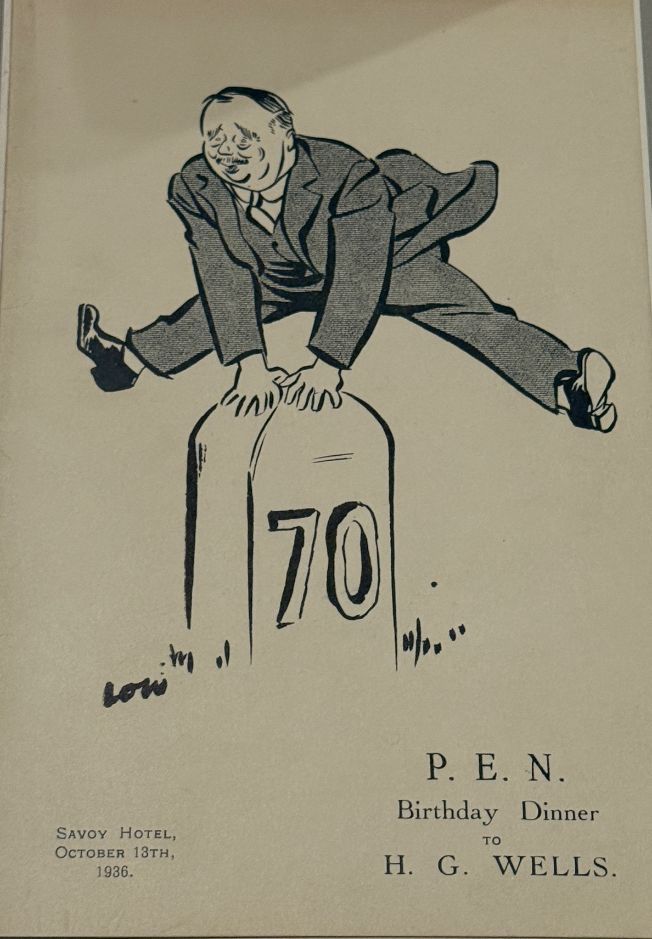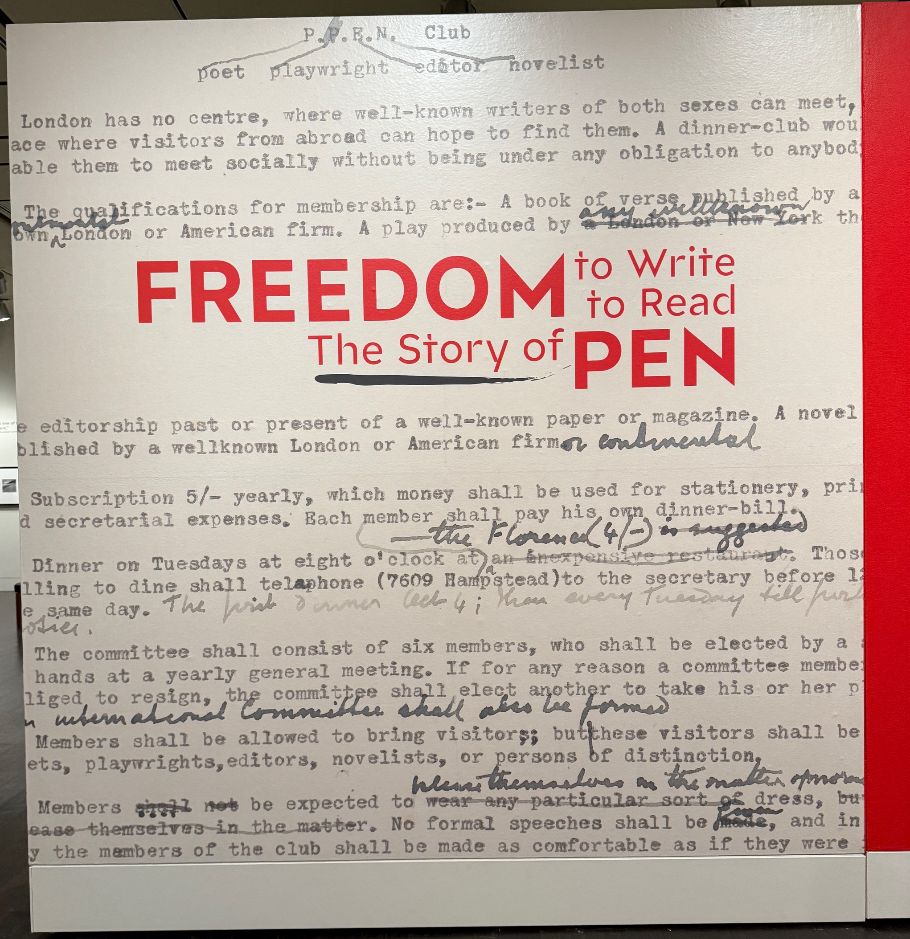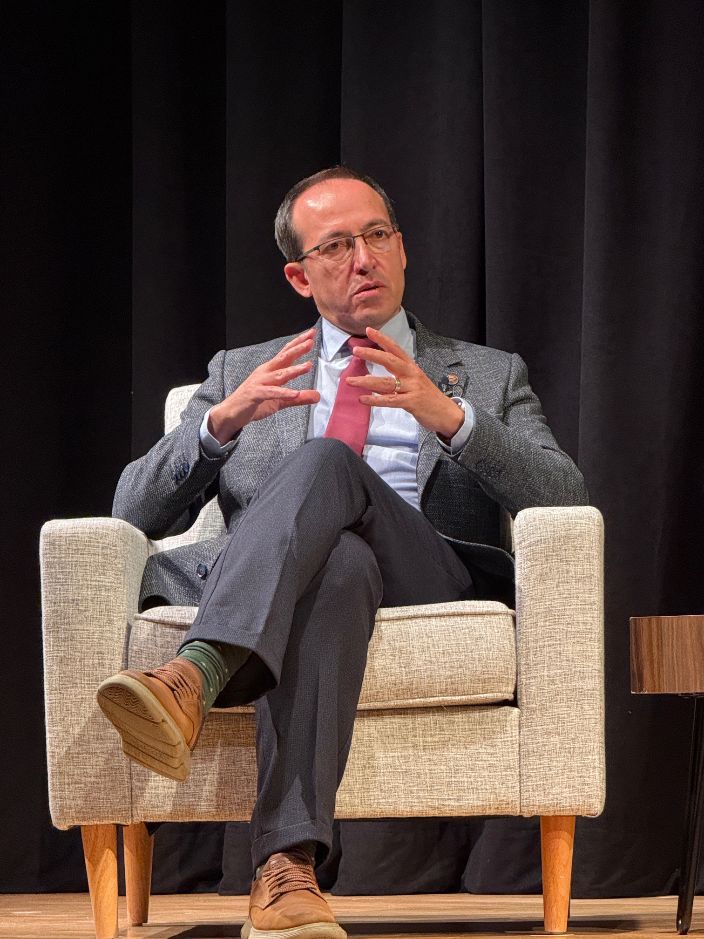The Ransom Center at the University of Texas here in Austin is currently hosting an exhibit to celebrate PEN. That is short for Poets, Essayists and Novelists, an international organization.
As described on the Ransom website:
“Founded in London in 1921 by Catharine Amy Dawson Scott, it held its first dinner meeting on October 5th to bring together writers to socialize and share ideas. Forty-one writers attended the inaugural dinner including John Galsworthy, Sheila Kaye-Smith, Louis Golding, and Rebecca West. Within a few years, the organization established centres throughout Europe, and by the 1930s included centres in Asia and South America. The first two Presidents of PEN, John Galsworthy (1921-1933) and H. G. Wells (1933-1936), helped PEN evolve from a dinner club for like-minded literati to a writers’ organization focused on free expression and human rights.”
At a special event last week, the President of PEN (lead photo) was in attendance for a wide-ranging discussion. Burhan Sönmez is a famed Turkish novelist, whose works have been translated into 48 languages. He said that PEN is supported by three ‘pillars’ that define its existence.
“We say we defend freedom of expression, we promote literature, and we try to improve the solidarity of writers. When we describe those three characteristics, principle of energy national, maybe it will be good to look at the time when and was founded in 1921.
“Just after the First World War in Europe, it was a time like today : Nations divided by the war; hatred of the other. In that difficult period a group of writers in London, said that ‘we need to improve something against the division of war and politics. We need to build new bridges between nations.’
“That’s how they started together and immediately one year after the first meeting it started to become an international organization and introduced to the United States in just one year. And since then, for a hundred and three years, we are trying to improve these principles in every new decade, in every new year.
“We are not shy of conflicts. If there’s a conflict in any region, in any country, we would like to address the issue. If we try to avoid that kind of conflict, then they get bigger and bigger. Then two or five years later it becomes a major issue for the organization.
“The main turning point was 1933 when the Nazi issue, especially defending Jewish writers in Germany, appeared to be the first conflict within the community. It was the first year of our second present, H. G. Wells: he was a great writer, but also a great thinker. He understood the gravity of this problem. In 1933, many people still don’t know the nature of fascism and racism spreading across Europe.”
Matter came to a head at the Congress in Dubrovnik. Ernst Toller at the time was a great screenplay writer of Jewish origin. Despite being expelled by Germany PEN he came to Congress and said, ‘I’d like to address the assembly to let you know what’s going on in the German PEN center.’
“But in our legal system,” said Sönmez, “he was not an elected delegate: Germany PEN had other delegates, and they said that he cannot speak because we didn’t appoint him, we expelled him. So, Wells used his powers and invited Toller to the stage. And then immediately, Germany PEN, followed by a few other PEN centers in Europe, left the assembly. They did not return or another 13 years! That’s how first we started to see that an external conflict outside the organization might turn to into an internal conflict.”
“In recent years – almost every year – we have to deal with new conflicts (Ukraine and Gaza, for example) and find new ways to address those issues.

“And when we try to find a common ground, it doesn’t mean that we agree 100%. We go, we speak and we try to find a similar way to go through to get it. We are happy to fight at the beginning but at the end we should leave the same room, arm in arm. We claim that we create our own destiny and fate. But sometimes we realize that actually other elements of forces direct our destiny.”
Sönmez described his own difficult journey in the country of Turkey in the 1990s. “It was the peak time of civil war, with a campaign of assassinations towards intellectuals. Every day some journalists killed, and academics were targeted too. I knew someday it was my turn to be killed. I survived luckily, but heavily wounded, and then my treatment lasted more than seven or eight years. I found myself in exile in London, but as a lawyer you have nothing because your license is not recognized and my health was not good. I was always in bed, so I started to write novels. After ten years, I managed to go back to Turkey.”
During his time in Britain, Sönmez became a member of English PEN. He also joined as a member of Turkish PEN, and the Kurdish PEN center. While in Turkey he was again very active in politics and civil rights issues, especially working for the Soviet peace process in the Kurdish civil war.
After attending a New York literary festival, he was invited to join the board of PEN International. He declined, but six months later changed his mind. In September 2021, he was elected President for a six-year term.
Sönmez explained that PEN centres are usually associated with their own country, but where this is not lawful (such as Iran), they establish PEN centres in exile. “My own nation’s Kurdish PEN was founded in 1988 in Germany in exile.” There is even an Esperanto PEN, which has members in many countries.
When members are in peril, such as after the fall of Afghanistan to the Taliban, PEN was able to rescue many writers and their families.
“This is, I think, the power of an international organization, that we improve throughout our history by seeing the situations locally and regionally. We daily see that every problem has a different power dynamic.”
Visitors to the Ransom Centre can see a variety of exhibits from the archives, including an unusual jacket work by George Bernard Shaw. Primarily using photographs paired with original documents, the troubled history of PEN is traced from 1922 to the present. Being short of funds, an especially low point happened in 1967, when The Washington Post revealed that PEN was being funded by the CIA. An entire wall is devoted to the development of the scandal, starting with denial, to an admission, to the resignation of Stephen Spender from the editorial board in protest over the secret funding.
An inventory of the historical records of PEN is at the Ransom Center, and can be found at this link:
https://norman.hrc.utexas.edu/fasearch/findingAid.cfm?eadid=01209
For more on PEN International, visit their website:
www.pen-international.org
Pictured below: the entry to the PEN exhibit at the Ransom Center.

